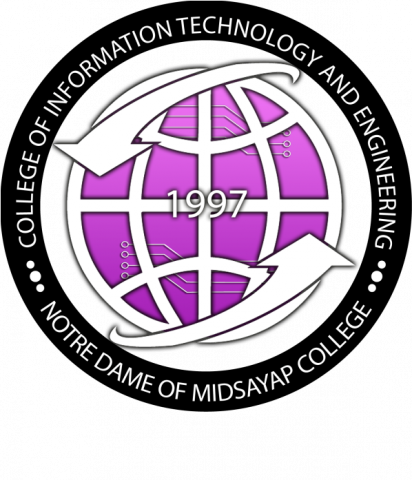BSCS|BSIS|BSIT - Program Educational Objectives and Program Outcomes
Bachelor of Science in Computer Science (BSCS)
The Program Educational Objectives are as follows:
A. Acquire supervisory positions in the design and development of computer software.
B. Acquire careers in the Non-Government and Government sectors.
C. Handle small or big projects as a computing freelance worker.
D. Pursue an advanced degree and other computing competencies or engage a research career in the field.
BSCS Program Outcomes:
The graduates of the Bachelor of Science in Computer Science program have the ability to:
A. Apply knowledge of computing fundamentals, knowledge of a computing specialization, and mathematics, science, and domain knowledge appropriate for the computing specialization to the abstraction and conceptualization of computing models from defined problems and requirements
B. Identify, analyze, formulate, research literature, and solve complex computing problems and requirements reaching substantiated conclusions using fundamental principles of mathematics, computing sciences, and relevant domain disciplines
C. An ability to apply mathematical foundations, algorithmic principles and computer science theory in the modeling and design of computer-based systems in a way that demonstrates comprehension of the tradeoffs involved in design choices
D. Knowledge and understanding of information security issues in relation to the design, development and use of information systems
E. Design and evaluate solutions for complex computing problems, and design and evaluate systems, components, or processes that meet specified needs with appropriate consideration for public health and safety, cultural, societal, and environmental considerations
F. Create, select, adapt and apply appropriate techniques, resources and modern computing tools to complex computing activities, with an understanding of the limitations to accomplish a common goal
G. Function effectively as an individual and as a member or leader in diverse teams and in multidisciplinary settings
H. Communicate effectively with the computing community and with society at large about complex computing activities by being able to comprehend and write effective reports, design documentation, make effective presentations, and give and understand clear instructions
I. The ability to recognize the legal, social, ethical and professional issues involved in the utilization of computer technology and be guided by the adoption of appropriate professional, ethical and legal practices
J. Recognize the need, and have the ability, to engage in independent learning for continual development as a computing professional.
Bachelor of Science in Information Systems (BSIS)
The Program Educational Objectives are as follows:
A. Acquire supervisory positions in the modelling or implementation of information systems solution in a competitive business environment.
B. Acquire careers in the Non-Government and Government sectors.
C. Handle small or big projects as a computing freelance worker.
D. Pursue an advanced degree and other computing competencies or engage a research career in the field.
BSIS Program Outcomes:
The graduates of the Bachelor of Science in Information Systems program have the ability to:
A. Apply knowledge of business processes, computing, mathematics and social sciences appropriate to information systems.
B. Analyze a problem, identify and define the computing requirements with respect to organizational factors appropriate to its solution and plan strategies for their solution.
C. Evaluate information system in terms of general quality attributes and possible trade-offs presented within the given requirement.
D. Design, implement, and evaluate information systems, processes, components, or programs and to source cost-benefit efficient alternatives to meet desired needs, goals and constraints.
E. Use knowledge and understanding of enterprise in modeling and design of information systems.
F. Deploy and use effectively skills, tools and techniques necessary for information systems practice.
G. Functions effectively on teams (recognizing the different roles within a team and different ways of organizing teams) to accomplish a common goal.
H. Communicate effectively with a range of audiences. Communication skills include technical writing, presentation and negotiation and numeracy.
I. Recognize the legal, social, ethical and professional issues involved in the exploitation of computer technology and be guided by the adoption of appropriate professional, ethical and legal practices both in the local and global community.
J. Recognize the need for and engage in an independent and life-long learning, planning self-learning and improving performance as the foundation for on-going professional development.
Bachelor of Science in Information Technology (BSIT)
The Program Educational Objectives are as follows:
A. Acquire supervisory positions in the design and development of computer software, hardware and maintenance of IT infrastructure.
B. Acquire careers in the Non-Government and Government sectors.
C. Handle small or big projects as a computing freelance worker.
D. Pursue an advanced degree and other computing competencies or engage a research career in the field.
BSIT Program Outcomes:
The graduates of the Bachelor of Science in Information Technology program have the ability to:
A. Apply knowledge of computing science and mathematics appropriate to the discipline.
B. Understand the best practices and standards and their applications.
C. Analyze complex problems and identify and define the computing requirements appropriate to its solution.
D. Identify and analyze user needs and take them into account in the selection, creation, evaluation and administration of computer based systems.
E. Design, implement and evaluate computer-based systems, processes, components, or programs to meet desired needs and requirements under various constraints.
F. Integrate IT-based solutions into the user environment effectively
G. Apply knowledge through the use of current technique, skills, tools and practices necessary for IT profession.
H. Functions effectively as a member or leader of a development team recognizing the different roles within a team to accomplish a common goal.
I. Assist t in the creation of an effective IT project plan.
J. Communication effectively with the computing community and with society at large about complex computing activities through logical writing, presentation and clear instructions.
K. Analyze the local and global impact of computing information technology on individuals, organization and society.
L. Understand professional, ethical, legal, security and social issues and responsibilities on individuals, organizations and society.
M. Recognize the need for and engage in planning self-learning and improving performance as a foundation for continuing professional development.
